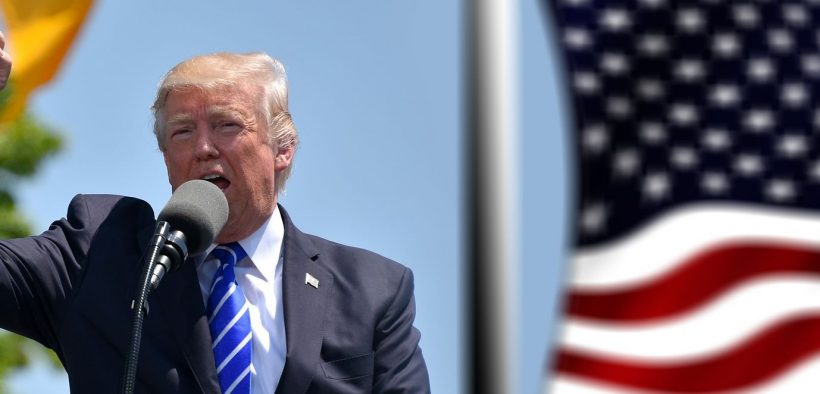Appeals Court Reinstates Lawsuit Against Trump

“I got sued on a thing called emoluments. Emoluments. You ever hear of the word? Nobody ever heard of it before. And what it is is presidential harassment, because [the presidency] is costing me a fortune, and I love it.”
At the end of last week, a Federal Appeals Court reinstated a lawsuit against President Trump — one that had been dropped almost two years ago. The lawsuit, filed by a watchdog group and a restaurant owner in Washington D.C., alleged that the president had violated the emoluments clause of the Constitution.
Federal Court Brings Emoluments Lawsuit Against Trump Back to Life
According to the lawsuit, the president has illegally profited from his restaurants and hotels in Washington D.C. and New York, violating the U.S. Constitution’s emoluments clause. The plaintiff, owner of restaurants in Washington D.C. and New York City, alleged that he was being “damaged” by the president’s competing properties.
After the lower court dismissed the case nearly two years ago on the grounds that the plaintiff “lacked standing” to sue, the Second Circuit Court of Appeals in New York recently reinstated the case.
A judges’ panel on the Appeals Court decided that George B. Daniels, the lower court judge, had dismissed the lawsuit against the president too “precipitously.” In a two-one ruling, the Appeals Court judge ordered the lawsuit to proceed, sending it back to the lower court.
According to CREW’s (Citizens for Responsibility and Ethics in Washington) Executive Director Noah Bookbinder’s statement, “If President Trump would like to avoid the case going further and curtail the serious harms caused by his unconstitutional conduct, now would be a good time to divest from his businesses and end his violations of the emoluments clauses of the Constitution.”
The Emoluments Clause Defined
The dictionary defines emoluments as “the returns arising from office or employment usually in the form of compensation or perquisites.”
Article I, Section 9, Clause 8 of the U.S. Constitution, often known as the “Foreign Emoluments Clause,” states that “no Person holding any Office of Profit or Trust under them, shall, without the Consent of the Congress, accept of any present, Emolument, Office, or Title, of any kind whatever, from any King, Prince or foreign State.”
According to the “Domestic Emoluments Clause,” or Article II, Section 1, Clause 7, “The President shall, at stated Times, receive for his Services, a Compensation, which shall neither be increased nor diminished during the Period for which he shall have been elected, and he shall not receive within that Period any other Emolument from the United States, or any of them.”
The lawsuit against President Trump is a historical first; no other U.S. president has been sued for allegedly violating the Constitution’s Emoluments Clause.
The Decision and the President’s Remarks
“Plaintiffs have plausibly pleaded that the President’s ownership of hospitality businesses that compete with them will induce government patrons of the hospitality industry to favor Trump businesses over those of the Plaintiffs so as to secure favorable governmental action from the President and Executive branch,” Judge Pierre Leval said in the decision. The decision continues that “the district court demanded too much at the pleading stage.”
Later in the decision, Circuit Judge John M. Walker, Jr., stated, “I would affirm the district court. The remaining plaintiffs in this case have failed to specify that any actual injury was caused by the President’s alleged violation of the emoluments clauses, or how this Court could redress such an injury.”
The judge ended his remarks with this dissent:
The case before us is markedly different. The competitor standing suit against the President has little in common with these three categories of cases. Even accepting the plaintiffs’ broad construction of the Emoluments Clauses, the Clauses were never designed to, and nor do they, directly regulate the marketplace or the market player as it functions in the marketplace. The Emoluments Clauses have never been characterized as market‐oriented, no case has ever stretched the competitor standing exception this far, and, as is evident from the Supreme Court’s decision in Already, such a stretch goes further than the competitor‐standing pleading exception can bear. In sum, because the plaintiffs lack standing to challenge the President’s alleged acceptance of emoluments under either traditional standing principles or the competitor standing doctrine, I respectfully dissent.
In light of the decision, President Trump has three options. His advisers can ask the Supreme Court to review the case, or they can ask the Second Circuit to rehear it. The last option is for the case to go back to the district court for another review.
According to President Trump, the lawsuit is “presidential harassment.” “I got sued on a thing called emoluments. Emoluments. You ever hear of the word? Nobody ever heard of it before,” President Trump remarked at a speech in Pennsylvania in August. And what it is is presidential harassment, because [the presidency] is costing me a fortune, and I love it.”







